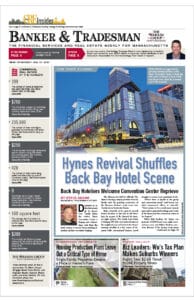As Greater Boston’s building boom continues unabated, there are bound to be delays in construction and delivery of the thousands of new condominiums expected to come online this year. Delays are an unfortunate part of the construction business, especially when building or renovating in an urban city with snowy winters.
But for buyers, construction delays mean closing dates become moving targets, which can result in unanticipated expenses and logistical living challenges; for attorneys and brokers, delays can result in unhappy clients.
“I tell my clients to go into this expecting everything that can go wrong, will go wrong,” said attorney Kosta Ligris, CEO and managing partner of Boston-based Ligris and Assoc. “You need a backup plan and a drop-dead date.”
Before a buyer makes an offer on a property under construction, they should do some research and find out if the builder has a reputation for delivering on time, Ligris said. Once the offer is made and accepted, he said, it’s all about managing expectations and communication.
Buyers should consider the closing date a target and not a guarantee. Greater Boston is a hot seller’s market and developers know they have an advantage; as a result, some are pushing for more wiggle room because buyers have so few options, Ligris said.
“Usually these contracts have extension dates,” he said. “Traditionally, it’s 30 days. We’re starting to see developers push that to 60 days and 90 days. The worst thing is when the developer sends you a contract that says the closing date is TBD or within 30 days of being issued a certificate of occupancy. That’s not a contract. Contracts need dates.”
Attorney Scott Kriss, president and CEO of Boston-based Kriss Law, said developers’ attorneys won’t always agree to language protecting buyers from additional expenses in the event of a delayed closing.
“We always try to write into our agreements that the seller will pick up the rate lock if there’s a delay, but it’s hard to get in there,” Kriss said. “They’re more apt to return a deposit because they figure another buyer will come in right behind them. It’s really interesting out there right now.”
Developer Charles Aggouras, owner of Somerville-based GFC Development, said he doesn’t think it’s fair to expect developers to pay for rate lock extensions or interim housing, as delays are often due to factors outside of their control.
“Often it’s the municipality, weather – and a big one is getting utility companies to show up,” Aggouras said. “And there’s no recourse against them. We’ve lost buyers because of them. These delays cost us a lot of money. There is nothing we can do most of the time.”
Constant, Clear Communication
As the one who typically facilitates communication between the buyer and developer, the real estate agent should proactively communicate progress and concerns between the parties, said Lisa Nickerson, owner of Nickerson Real Estate Partners.
“When the sales team isn’t being direct, things can go south,” she said. “We talk daily with the builders, so we know exactly what the schedule looks like. It’s our name on the line as much as the builder’s when we’re making a promise.”
Aggouras agreed, saying that since agents have more face-to-face contact with buyers, it’s incumbent on them to keep the buyers informed of progress on the building.
Same-day closing present a particular challenge in this environment, Kriss said, and a delayed closing results in clients with no place to stay or store their belongings.
“The people advising some of these buyers aren’t telling them not to end their current lease on the day it says in the purchase contract,” he said. “You don’t want them to double pay, but you want them protected.”
Constant contact with both sides helps identifies problems as early as possible, leaving both sides with more options, Nickerson said.
“Sometimes, people call and want to move delivery up because their job started sooner or their home sold sooner than they expected,” she said. “The sooner they tell us what’s happening, the more likely it is we can accommodate them.”
Ligris, who also represents developers, said he encourages them to be as forthcoming as possible to help buyers plan and avoid misunderstandings.
“I tell them to create a range of dates for the closing that they’re comfortable with,” Ligris said. “If it’s going to be a six-month range, let’s tell people that.”
Ligris and Kriss both said these delays used to be confined to Boston, but are now growing more common in the suburbs.
“Most attorneys are aware that if their client is buying property inside the 128 belt, and even outside, they can’t rely on a closing date,” Aggouras said. “It’s a fluctuating thing. The best thing you can do is ask a lot of questions and make sure you have alternative plans.”









